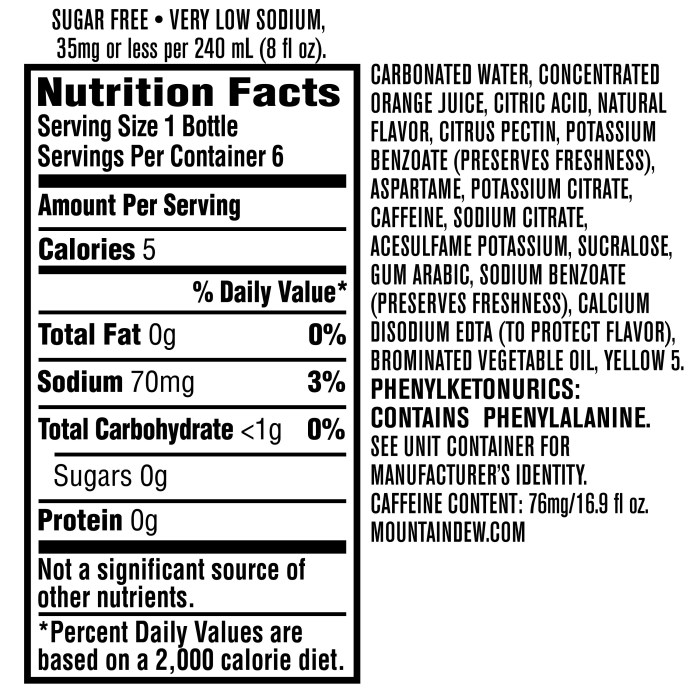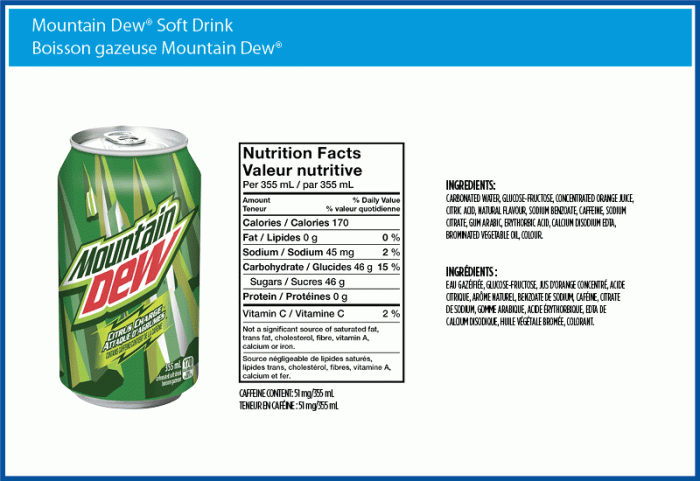Nutritional Information Analysis

Mountain dew diet nutrition facts – This section provides a detailed analysis of the nutritional content of a standard serving of Mountain Dew Diet, comparing it to other popular diet sodas. Understanding the nutritional profile of diet beverages is crucial for informed consumer choices, especially concerning long-term health implications.
The following bullet points present the nutritional information for a 12-ounce serving of Mountain Dew Diet, based on readily available data from reputable sources such as the manufacturer’s website and verified nutritional databases. It’s important to note that slight variations may occur depending on the source and manufacturing processes.
Nutritional Facts of Mountain Dew Diet (12 oz Serving)
- Calories: 0
- Total Carbohydrate: 0g
- Sugars: 0g
- Protein: 0g
- Total Fat: 0g
The absence of calories, carbohydrates, sugars, protein, and fat in a standard serving of Mountain Dew Diet reflects its formulation as a diet beverage. However, it is important to consider the presence of artificial sweeteners and other additives.
Percentage of Daily Recommended Values, Mountain dew diet nutrition facts
While Mountain Dew Diet contains zero calories and macronutrients, it’s important to understand that it does not contribute to the daily recommended values for essential nutrients. The following table provides a conceptual representation, highlighting the lack of contribution to essential nutrients. Note that percentages are all 0% as the product contains no significant nutrients.
Understanding the nutritional content of Mountain Dew Diet is crucial for mindful eating. While it’s low in calories, it’s high in artificial sweeteners. To contrast, consider a healthier alternative like lean protein, for example, checking out the detailed nutrition facts for boneless pork chops can help illustrate the difference in nutrient density. Returning to Mountain Dew Diet, remember to balance its consumption with other nutritious food choices.
| Nutrient | % Daily Value (per 12 oz serving) |
|---|---|
| Calories | 0% |
| Total Carbohydrate | 0% |
| Sugars | 0% |
| Protein | 0% |
| Total Fat | 0% |
| Vitamin A | 0% |
| Vitamin C | 0% |
| Calcium | 0% |
| Iron | 0% |
The absence of essential nutrients highlights the importance of relying on a balanced diet for optimal health, rather than solely consuming diet beverages.
Comparative Nutritional Profile of Diet Sodas
A visual comparison, such as a bar chart, would effectively illustrate the similarities and differences in the nutritional profiles of various diet sodas. The horizontal axis would represent different diet soda brands (e.g., Mountain Dew Diet, Diet Coke, Diet Pepsi). The vertical axis would represent the amount of each nutrient (calories, carbohydrates, sugars, etc.). Each bar would represent a specific nutrient for each soda brand.
The chart would visually demonstrate that most diet sodas share a similar lack of macronutrients, though minor variations in artificial sweeteners and other additives may exist.
For instance, a bar representing “calories” would show near-zero values for all diet sodas, clearly highlighting the low-calorie nature of these beverages. Similarly, bars representing sugars and fat would also reflect minimal or zero content. While subtle differences in artificial sweeteners or other minor ingredients might lead to minute variations, the overall nutritional profile would remain remarkably similar across the chosen diet sodas.
Health Implications and Concerns

Regular consumption of Mountain Dew Diet, like other diet sodas, presents potential short-term and long-term health implications primarily due to its high artificial sweetener content and acidic nature. While it avoids the caloric intake of its sugared counterpart, concerns remain regarding its impact on various aspects of health and well-being.
Short-Term and Long-Term Health Effects of Mountain Dew Diet Consumption
The immediate effects of consuming Mountain Dew Diet might include a temporary energy boost from the caffeine content, but this is often followed by a crash. Long-term consumption, however, is linked to a range of potential issues. Studies have suggested associations between regular diet soda intake and increased risk of cardiovascular diseases, metabolic syndrome, and type 2 diabetes. These associations are likely multifaceted, involving factors beyond just the artificial sweeteners.
For example, the high acidity of the beverage can contribute to dental erosion, and the caffeine can interfere with sleep patterns. Furthermore, the psychological impact of relying on artificially sweetened beverages for satiation and flavor needs further investigation. While direct causal links require further research, the observed correlations warrant caution.
Potential Risks Associated with Artificial Sweeteners and Their Impact on Metabolic Health
Artificial sweeteners, such as aspartame and sucralose found in Mountain Dew Diet, are intended to provide sweetness without calories. However, their impact on metabolic health remains a subject of ongoing debate. Some studies suggest that regular consumption of artificial sweeteners may disrupt gut microbiota, potentially leading to alterations in glucose metabolism and increased risk of metabolic disorders. Other research indicates potential effects on insulin sensitivity and appetite regulation.
The long-term effects of these disruptions are not yet fully understood, and more research is needed to establish definitive conclusions. It’s crucial to note that the research findings on artificial sweeteners are often inconsistent, and the impact likely varies depending on individual factors such as genetics, overall diet, and lifestyle.
Impact of Mountain Dew Diet on Dental Health Compared to Other Beverages
Mountain Dew Diet, due to its high acidity, poses a significant risk to dental health. The low pH level of the beverage can erode tooth enamel over time, increasing susceptibility to cavities and dental sensitivity. Compared to other beverages, Mountain Dew Diet’s impact on dental health is potentially more severe than that of water or milk, which are neutral or mildly alkaline.
While some juices also exhibit acidity, the combination of high acidity and frequent consumption associated with carbonated beverages like Mountain Dew Diet makes it particularly damaging to teeth. Regular consumption of this beverage increases the risk of dental erosion more significantly than other commonly consumed beverages with a lower pH level, even other carbonated beverages.
Comparison with Other Diet Beverages: Mountain Dew Diet Nutrition Facts
Mountain Dew Diet, like other diet beverages, aims to provide the taste of a carbonated soft drink without the calories and sugar typically associated with its full-sugar counterparts. However, a direct comparison with other zero-calorie or low-calorie alternatives reveals significant differences in nutritional profiles and potential health impacts. This section analyzes Mountain Dew Diet’s position within the broader landscape of diet beverages.
A comprehensive understanding requires considering not only caloric and sugar content but also the presence of artificial sweeteners, added flavors, and other ingredients. The following table compares Mountain Dew Diet to several popular alternatives, highlighting key nutritional variations.
Nutritional Comparison of Diet Beverages
| Beverage | Calories | Sugar Content (grams) | Other Key Nutrients |
|---|---|---|---|
| Mountain Dew Diet | 0 | 0 | Artificial sweeteners (aspartame, acesulfame potassium), citric acid, natural and artificial flavors, caffeine |
| Diet Coke | 0 | 0 | Artificial sweeteners (aspartame, acesulfame potassium), phosphoric acid, caffeine, caramel color |
| Pepsi Zero Sugar | 0 | 0 | Artificial sweeteners (aspartame, acesulfame potassium), citric acid, caffeine, caramel color |
| Sprite Zero | 0 | 0 | Artificial sweeteners (aspartame, acesulfame potassium), citric acid |
| La Croix (Sparkling Water) | 0 | 0 | Carbonated water, natural flavors |
The table demonstrates that while many diet beverages share a common characteristic of zero calories and sugar, they differ significantly in their other ingredients. These variations influence taste, potential long-term health effects, and individual consumer preferences.
Health Implications of Different Diet Beverage Choices
The long-term health effects of consuming artificial sweeteners remain a subject of ongoing research. While these sweeteners do not contribute to caloric intake or directly raise blood sugar levels, some studies suggest potential associations with metabolic changes, although the causal relationship is not definitively established. The presence of other additives, such as artificial colors and flavors, also raises concerns for some consumers.
In contrast, unsweetened sparkling water offers a calorie-free and additive-free alternative. Choosing between these options involves weighing the potential benefits of zero-calorie consumption against concerns regarding long-term effects of artificial ingredients. For example, some individuals might experience digestive discomfort from artificial sweeteners, highlighting the need for personalized choices.
Advantages and Disadvantages of Choosing Mountain Dew Diet
Choosing Mountain Dew Diet over other diet beverages presents both advantages and disadvantages. One advantage is its familiar, distinct taste profile, appealing to those accustomed to the Mountain Dew flavor. However, its higher caffeine content compared to some other diet sodas might be a disadvantage for individuals sensitive to caffeine. The use of multiple artificial sweeteners, as opposed to a single sweetener in some other brands, could also be a concern for consumers seeking to minimize artificial ingredient intake.
Ultimately, the optimal choice depends on individual preferences, health considerations, and tolerance to various artificial sweeteners and additives.
Consumer Perception and Marketing
Mountain Dew Diet’s marketing success hinges on its ability to appeal to a specific consumer base while navigating the complexities of the diet beverage market. The brand’s perception is shaped by a combination of its advertising strategies, product positioning, and consumer response to its messaging.The manufacturer, PepsiCo, employs a multi-pronged marketing approach to promote Mountain Dew Diet. This strategy leverages established brand recognition associated with the original Mountain Dew, capitalizing on its association with energy and excitement.
Marketing campaigns often emphasize the “diet” aspect by highlighting the absence of sugar, appealing to health-conscious consumers while simultaneously maintaining the brand’s energetic image. This is often achieved through visually stimulating advertisements featuring action sports or extreme activities, associating the drink with an active lifestyle. Digital marketing, including social media engagement and targeted online advertising, plays a significant role in reaching younger demographics.
Celebrity endorsements and strategic partnerships with relevant events or organizations further amplify the brand’s reach and influence.
Target Audience and Market Positioning
Mountain Dew Diet’s primary target audience consists of young adults, particularly males aged 18-35, who are active, value convenience, and are seeking a less-sugary alternative to traditional soft drinks. The product is positioned as a “better-for-you” option within the larger energy drink and carbonated soft drink market, aiming to attract consumers who are mindful of their sugar intake but do not want to compromise on taste or the invigorating feeling associated with the Mountain Dew brand.
This positioning requires a delicate balance: maintaining the brand’s identity while simultaneously emphasizing the health benefits, a challenge inherent in marketing products that cater to both health-conscious and pleasure-seeking consumers. The marketing strategy seeks to attract consumers who appreciate the energetic image of Mountain Dew but also desire a lower-calorie choice.
Potential Advertising Campaign: “Fuel Your Day, the Smart Way”
This campaign would focus on the dual nature of Mountain Dew Diet: providing the familiar energy boost of Mountain Dew while being a lower-calorie option. Advertisements would feature individuals engaging in dynamic activities, highlighting the drink’s ability to support an active lifestyle. However, unlike previous campaigns that primarily focused on the energetic aspect, this campaign would incorporate subtle messaging about responsible consumption and balanced living.
For example, an advertisement might depict a group of friends cycling through a scenic landscape, enjoying Mountain Dew Diet as a refreshing beverage during their activity, with a clear message emphasizing the lower calorie count as a smart choice for active individuals. The campaign would also incorporate testimonials from athletes or fitness enthusiasts, further emphasizing the drink’s suitability for an active lifestyle.
Ethical considerations would be addressed by avoiding misleading claims or exaggerating the health benefits. The campaign would explicitly mention the presence of artificial sweeteners and other ingredients, promoting transparency and responsible marketing practices. The campaign’s visuals would avoid portraying unrealistic body images or promoting unhealthy lifestyles. Instead, it would emphasize the enjoyment of physical activity and the role of Mountain Dew Diet as a complement to a healthy and active lifestyle.
Helpful Answers
Is Mountain Dew Diet safe for daily consumption?
While it contains zero calories and sugar, moderate consumption is recommended. Excessive intake of artificial sweeteners may have potential long-term health consequences, warranting further research and individual consideration.
Does Mountain Dew Diet affect dental health?
Like other carbonated beverages, it can contribute to dental erosion due to its acidity. Rinsing your mouth with water after consumption can help mitigate this risk.
How does Mountain Dew Diet compare to other diet colas in terms of taste?
Taste preferences are subjective. Some find it similar to other diet colas, while others note a distinct flavor profile. Personal preference plays a significant role.
Are there any known interactions between Mountain Dew Diet and medications?
Currently, there’s no widely documented interaction between Mountain Dew Diet and specific medications. However, if you have concerns, consult your physician or pharmacist.



